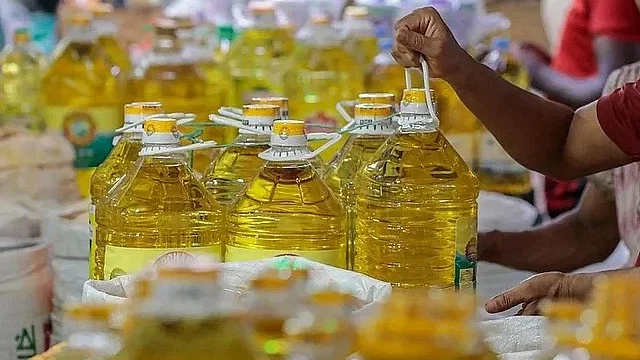Bottled soybean oil contains harmful ‘trans fat’

Bottled soybean oil available in the domestic market has been found to contain higher than acceptable levels of trans-unsaturated fatty acids. These harmful substances pose a long-term risk of high blood pressure and heart disease.
This revelation comes from a two-year study conducted by 13 researchers from Dhaka University’s Institute of Nutrition and Food Science and BRAC University’s James P. Grant School of Public Health. Approximately 67 per cent of the samples of bottled soybean oil from various companies in the market were found to contain trans fatty acids above the tolerable level. For open soybean oil, the rate is around 25 per cent. None of the palm oil samples were found to have trans fatty acids above the tolerable levels.
Trans fatty acids, commonly known as transfats, can develop in soybean oil during the refining process. This study highlights that transfats tend to increase when edible oils undergo refining at high temperatures, according to previous research.
Nazma Shaheen, the team leader of the research and professor at the Institute of Nutrition and Food Science of Dhaka University, explained , “The research aimed to assess the quality of edible oil in the country. According to our research findings, the condition of the edible oil available in the market suggests long-term damage to the public health of the country.”
Professor Nazma Shaheen also mentioned that the government’s safe food authority has established the tolerable level of transfat in edible oil in accordance with the guidelines of the World Health Organization (WHO). It is feasible to decrease the amount of transfat if the companies refining edible oil demonstrate greater awareness and if the relevant government agencies enhance their supervision.
Similar studies have been conducted in various countries, including China and India, where transfats were discovered to exceed the tolerable levels.
1521 sample tests
In the study, samples were collected from all eight divisions of the country. A total of 1,521 oil samples were collected from three markets (one urban and two rural) in each division and subjected to testing.
The researchers tested a total of 106 ‘composite’ samples of edible oil, including 18 ‘composite’ samples of branded soybean oil, 49 open oil samples from retail establishments, 11 (composite) palm oil brands, and 28 (composite) samples of open palm oil. The sampling period was between February-March and June-August 2021. Additionally, samples were collected from five factories. The collected samples underwent testing at the Independent University (IUB) laboratory.
An article presenting the results of this research was published on January 7 in Food Chemistry Advances, an international science journal. According to the researchers, this is the first comprehensive study on the quality of edible oil in the country.
High in soybeans
Out of the 18 ‘composite’ samples of bottled soybean oil, 12 were discovered to have transfats exceeding acceptable levels. Transfats were also present in the remaining samples, albeit at lower levels. Similarly, for open drum soybean oil, 12 ‘composite’ samples were found to have transfats above acceptable levels, while 37 were found to contain lower levels.
No palm oils were found to exceed acceptable levels of transfats. However, all samples were found to contain transfats, albeit at levels lower than the normal threshold.
In 2021, the Food Safety Authority introduced regulations to control trans fatty acids in food products, effective from 31 December, 2022, with a maximum level set at 2 per cent. However, the study found that overall, soybean oil samples contained transfats two to four times higher than the standard levels. The researchers have not disclosed the name of the company producing and marketing the oil.
Md Akhtar Mamun, Director of the Safe Food Authority’s Food Purity Inspection and Judicial Proceedings Division, stated that they have not yet reviewed the research report and will be able to comment after doing so.
Monzur Morshed Ahmed, the principal scientific officer of Bangladesh Council of Industrial and Scientific Research, recently concluded his tenure as a member of the Safe Food Authority. During his time in the agency, he played a role in drafting the Transfat Control Regulations.
In a statement, Monzur Morshed Ahmed mentioned that he was aware of the research while he was with the organization, and the findings of this study influenced the formulation of regulations. He emphasised that all possible types of food must be regularly checked to determine the presence of transfats, but currently, the tests are not conducted in that manner.
Monzur Morshed Ahmed also noted that the risk of transfats is higher in dalda and food made from dalda than in edible oil.




